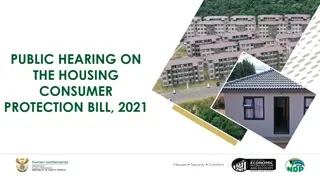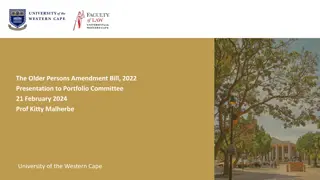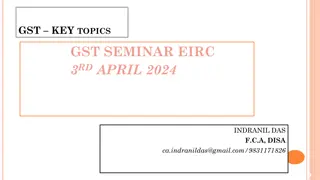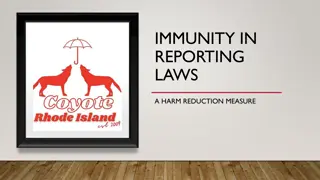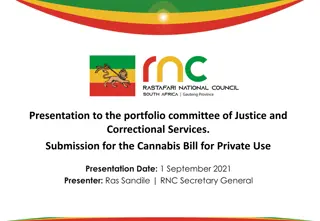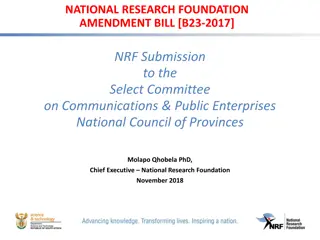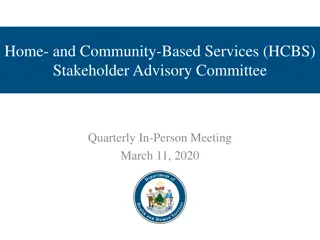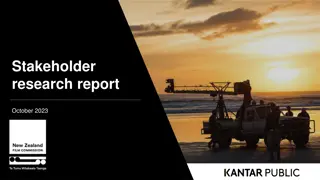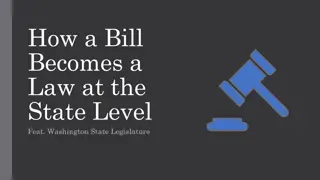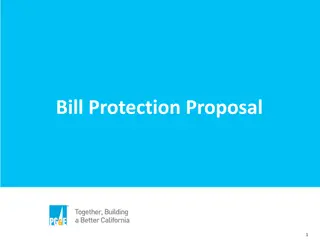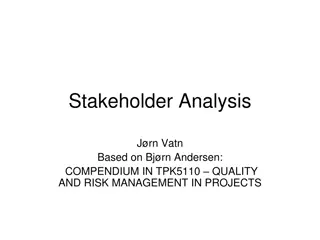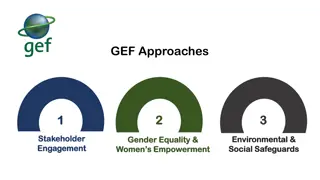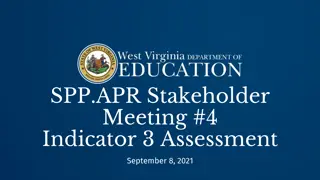Key Stakeholder Issues on PDAL Bill [B8 2021] 24 October 2023
High-level overview of key stakeholder issues on the PDAL Bill, including concerns about consultation with Traditional Leaders, technical definitions favoring commercial enterprises over communal farming, and the need for funding and support for small-scale farmers. Stakeholders emphasize the importance of including Traditional Leaders in land preservation and development efforts and urge for a more inclusive approach to address the diverse needs of agricultural land users.
Download Presentation

Please find below an Image/Link to download the presentation.
The content on the website is provided AS IS for your information and personal use only. It may not be sold, licensed, or shared on other websites without obtaining consent from the author.If you encounter any issues during the download, it is possible that the publisher has removed the file from their server.
You are allowed to download the files provided on this website for personal or commercial use, subject to the condition that they are used lawfully. All files are the property of their respective owners.
The content on the website is provided AS IS for your information and personal use only. It may not be sold, licensed, or shared on other websites without obtaining consent from the author.
E N D
Presentation Transcript
KEY STAKEHOLDER ISSUES ON PDAL BILL [B8 2021] 24 OCTOBER 2023 1
Overview BACKGROUND High-level overview of the key issues raised by stakeholders written & oral. Issues from Provincial Public Hearings. DALRRD responses did not comprehensively cover Provincial Hearings Common issues from some written submissions and/or Parliamentary oral presentations. 2
Consultation and non-recognition of Overview Traditional Leaders There was a concern with lack of consultation of Traditional Leaders, who are custodians of communal land, during the drafting of the Bill by the Department. The PDAL Bill does not consider Traditional Leaders who are custodians of communal land and play a significant role in the allocation and administration of agricultural land in communal areas. Stakeholders further proposed that the Bill needs to ensure that Traditional Leaders, who administer most communal land are considered and involved in the preservation and development of agricultural land in communal areas through the Institutional Structures as envisaged in Chapter 4 of the Bill. The Advisory Committees to the Minister or MECs should be inclusive and operate in a bottom-up approach. 3
Overview Technical definitions and applicability (1) The Bill was drafted with large-scale commercial agricultural enterprises in mind and does not take into account the duality of South African Agriculture as evidenced by some of the technical definitions that are irrelevant to communal and subsistence farming. For example, agriculturalpotential , farmingunit and viable farming unit, all premised on financial investment and profitability, thus disadvantaging subsistence and resource poor farmers. Landowner is recognised in terms of a registration according to the Deeds Registries Act whilst communal farmers and other smallscale farmers do not own the land on which they farm. In addition to the above definitions, and despite the Department s assertion that the Bill applies to all land and land users in the Republic, it might be difficult and costly for communal and smallscale farmers to meet some of the requirements envisaged in Section 15(4) on Agro- ecosystem authorisations; and the fines proposed under Clauses 35. 4
Technical definitions and applicability (2) The definition of farmer , excludes persons employed by the farmer, therefore, concern about the impact of the declaration of Protected Agricultural Areas on the tenure security of farm dwellers and labour tenants. As the Bill seeks to preserve and develop agricultural land, it needs to have a clause that provides for funding of communal & smallscale farmers to expand & develop land through the provision of assistance with basic necessities of agricultural production, i.e. production inputs, production infrastructure, provision for access to water, technical support and market access; and outline how smallscale farmers will be assisted in line with Clause 4(f)(iii). Further, while preserve is defined, develop/development is not defined. For the purposes of the Bill there might be a need to define develop/development, sustainable development and development framework. The use of agricultural land should not be confined to food production recognition other uses such as fibre, medicinal, cultural and spiritual purposes. 5
Impact of climate change not explicitly given due consideration in the Bill Overview To address climatic changes, there should be an up to date, regularly maintained & easily accessible database on agricultural, climatic and soil conditions for the country. The Department responded that the impact of climate change will be addressed through the agro- ecosystem delineation, sector plans & implementation, applicable to the relevant agro-ecosystem. However, it might be necessary to include responsiveness to climate change in the prescribed criteria for the compilation of Agricultural Sector Plans on Clause 6. The Bill does not take into account land use change due to ecological constraints or climatic changes - concern with restrictions on land owners regarding sale of their land or change in land use. Department gave assurance that the Bill will not interfere with activities on privately- owned properties, however, there is no clear provision for land users on public or communal land without title deeds. 6
Overview The Advisory Committee(s) The Bill s Institutional Structures proposed in Chapter 4, should recognise the expertise of private individuals and civil society organisations that are already involved in facilitating and promoting Conservation Agriculture. In its response, the Department is of the opinion that the configuration of the Advisory Committee is sufficient. However, in light of climate change and the definition of sustainableagriculture which put emphasis on practices having a site-specific application that complements ecological and biodiversity conservation .. , expertise on such practices becomes essential in the Advisory Committee. 7
Overview Regulation of game farming In some provinces concerns were raised about game farming and how the Bill does not provide clarity on biodiversity management in respect of keeping game/wildlife except in the definition of agriculturalpurposes through the reference on keeping wild animals. The Department needs to clarify whether game farming in the country is administered under DALRRD or Department of Forestry, Fisheries and Environment (DFFE); and further clarify how game farming will be regulated through the PDAL Bill? 8
Overview Implementability of the Bill The cost and administrative burden that the Bill proposes to farmers and other spheres of government will render it not implementable. It was proposed that the SALA Repeal Act should be signed into law and a new Policy be developed to ensure transformation and land reform. 9
Lack of a policy to manage and regulate the use of Overview municipal commonages The municipalities do not see farming in commonages as their responsibility. Even in cases where they lease commonages to farmers, there s no provision of services. Some development. will rather prioritise commonages for housing Clarity was sought on the management responsibility for commonages & the impact on the implementation of PDAL. 10
Overview Monitoring and evaluation The Bill should provide for an establishment of an independent business chamber for monitoring, evaluation and assessment of the implementation of the Bill instead of the function being the sole responsibility of the Minister and MECs as proposed in Clause 23 of the PDAL Bill on Performance assessment framework. 11
Accessible and effective means of communication Overview Stakeholders emphasised that the Government Gazette and national newspapers are not effective and accessible media of communication especially for rural people. Therefore, other media such as community radio stations, TV and Municipal offices should be considered; and communication should be in local languages. 12
Intergovernmental relations (IGR) Overview Poor coordination between government departments will negatively impact the capacity to implement the legislation asGovernment departments work in silos and rely on implementing agencies. DALRRD responded that conflict iro agro-eco authorisations will be addressed through intergovernmental relations processes. The Bill should have a Clause that clearly strengthen intergovernmental relations, which is the only way that the Bill can be effectively implemented. Relevant officials Departments should be well capacitated to implement the Bill. from local government and 13
Overview Concurrency of Agriculture There were some issues raised regarding the wording where provisions will have direct and significant impacts and consequences at provincial level, and it was recommended that they be amended to require the concurrence of the MEC in the province in which the land is situated. These were Clause 5(2) (exclusions from land evaluation & classification by the Minister) and Clauses 16(1), (2) and (3) (listing of activities and agricultural areas by the Minister). The Department did not accept the recommendations. 14
Overview Integration of authorisations (1) Clauses 14 & 15 - The Bill will introduce greater regulation on land owners/users in respect of agro-ecosystem authorisations; and it is not clear how it will address complexity of getting accreditation for land use as there are different processes between local government, provinces and national government. For example, how will the authorisation process be integrated to SPLUMA, NEMA and the MPRDA; and what weight will the PDAL Bill carry over mining licences and/or areas that are protected under NEMA? An integrated system of authorisations in respect of water, land, environmental matters, etc. was proposed such as that provided for under the Mineral and Petroleum Resources Development Act. 15
Overview Integration of authorisations (2) Submission from DFFE does not support the identification of activities requiring agro-authorisations for persons conducting activities on agricultural land as NEMA already makes provisions for the identification of activities that will have a detrimental effect on the environment including agricultural land, and provide for the authorisation of these activities. It further specifies that EIA Regulations (2014), Listing Notices 1 to 3 as amended, already include agricultural activities and activities to be taken on sensitive environments, which could include high potential agricultural land. It highlights the need to avoid parallel authorisation systems so as to simplify, streamline and avoid duplication of decision-making processes within government as required by the NDP. 16
Overview Possible Implications The cost of land evaluation and classification and possible limitation to agricultural land subdivision may result in higher land prices, which will negatively impact access to agricultural land by resource-poor farmers. There is also a lot of information that is not available in respect of communal areas as most have not been surveyed. Therefore, provinces where former homelands are located will need additional resources and capacity to gather information that will inform Provincial Agriculture Sector Plans. 17
Overview Possible Implications (2) Uncertainty regarding implementability due to lack of human resource capacity and financial resources to develop and enforce the implementation of agricultural sector plans; and to establish and review the agro-ecosystem authorisation system as well as enforcing compliance to authorisations. The Department indicated that PDAL Bill is a framework legislation and its implementation will take place at local government level, however, most municipalities have fiscal constraints and no human resource capacity. Stakeholders also raised concern with the implementation being an unfunded mandate as farmers generally do not get assistance from municipalities. Furthermore, during the Provincial Public Hearings, it became apparent that most Municipalities are not even familiar with the PDAL Bill and the obligations it will place on them once signed into law. The Department s response is that a plan is being developed to address capacity issues. 18
THANK YOU 19
![Key Stakeholder Issues on PDAL Bill [B8 2021] 24 October 2023](https://cdn1.slideorbit.com/88726/slide1-n.jpg)


